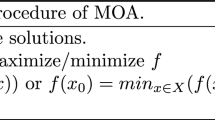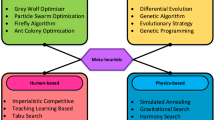Abstract
Various aspects of solving multiobjective discrete optimization problems are considered. Advantages of the equivalence set method are shown compared to other methods often used to solve multiobjective problems such as the method of successive concessions and the method of seeking the set of Pareto-optimal solutions. Theorems reflecting the main properties of the equivalence set method and showing the relationship and interrelation between the set of Pareto-optimal solutions and the equivalence set are formulated and proved.



Similar content being viewed by others
REFERENCES
R. V. Khachaturov, “Multiobjective optimization in a pseudometric objective space as applied to a general model of business activities,” Comput. Math. Math. Phys. 56, 1580 (2016).
R. V. Khachaturov, “Single- and multiobjective optimization on the lattice of cubes,” Comput. Syst. Sci. Int. 57, 750–758 (2018).
V. V. Podinovskii and V. D. Nogin, Pareto-Optimal Solutions to Multicriteria Problems (Nauka, Moscow, 1982) [in Russian].
A. Mas-Collel, M. D. Whinston, and J. R. Green, Microeconomic Theory (Oxford Univ. Press, New York, 1995).
H. Moulin, Axioms of Cooperative Decision Making (Cambridge Univ. Press, Cambridge etc., 1988).
R. Steuer, Multiple Criteria Optimization: Theory, Computation, and Application, Wiley Series in Probability and Statistics (Wiley, Chichester, 1986).
M. V. Gubko and D. A. Novikov, Game Theory in Organizational Systems Management (Sinteg, Moscow, 2002) [in Russian].
V. D. Nogin, Decision Making in a Multi-Criteria Environment: A Quantitative Approach (Fizmatlit, Moscow, 2002) [in Russian].
A. V. Lotov and I. I. Pospelova, Multi-Criteria Decision Making Problems (MAKS Press, Moscow, 2008) [in Russian].
A. N. Tikhonov and V. Ya. Arsenin, Solutions of Ill-Posed Problems (Nauka, Moscow, 1979; Halsted, New York, 1977).
Author information
Authors and Affiliations
Corresponding author
Additional information
Translated by N. Berestova
Rights and permissions
About this article
Cite this article
Khachaturov, R.V. Generalized Equivalence Set Method for Solving Multiobjective Optimization Problems. J. Comput. Syst. Sci. Int. 58, 922–931 (2019). https://doi.org/10.1134/S1064230719060091
Received:
Revised:
Accepted:
Published:
Issue Date:
DOI: https://doi.org/10.1134/S1064230719060091




